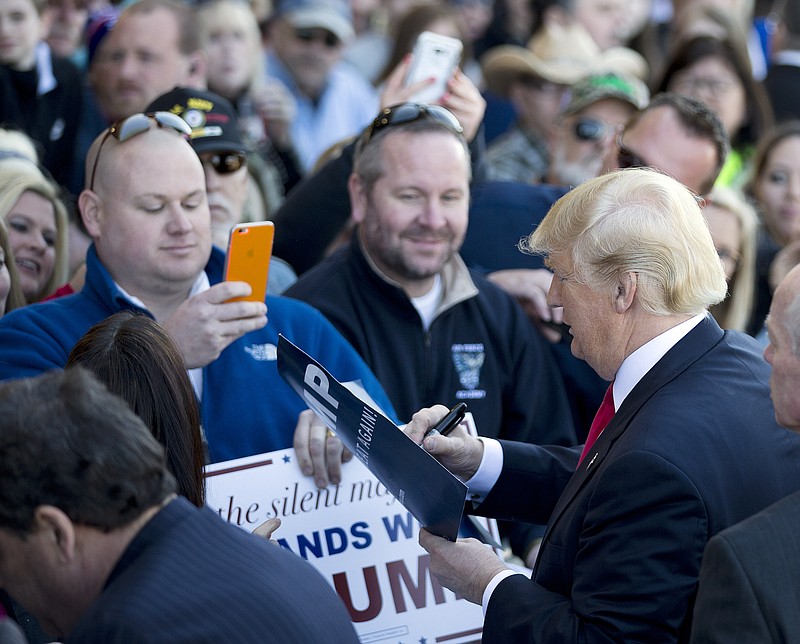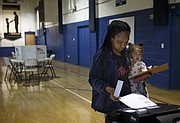Super Tuesday stories
* Cruz edges Trump in Alaska GOP contest* Sohn: The endless election season lurches ahead * Cooper: GOP digging hole for itself * Voices of voters as they cast ballots on Super Tuesday * Exit poll: Clinton expands base, Trump sells outsider image * Viewer's Guide: After Super Tuesday, cold hard delegate math * AP News Guide: Decision night, Super Tuesday * Trump claims 7 GOP victories, extending dominance * Clinton solidifies lead with wins in seven states * Trump and Clinton claim big Super Tuesday victories in South* Sanders wins in Colorado, Minnesota; Rubio gets first victory * Cruz, Clinton win in Texas primary; Sanders wins Oklahoma
Every Republican state primary election or caucus from here on out this spring in which there are more than two candidates is another step toward having more of the kind of governance we've enjoyed for the past seven years.
For the GOP, it's a game of political suicide.
Businessman Donald Trump cemented his lead in the delegate count on Super Tuesday, rolling up wins in Alabama, Georgia, Massachusetts, Tennessee and Virginia.
For Republicans, 595 delegates - nearly half the 1,237 needed to clinch the nomination - were available in 11 states.
Tennessee, which had the biggest percentage of evangelical voters and the third most GOP delegates at stake Tuesday, was giving Trump 43.1 percent. Georgia was providing him 43.2 percent and Alabama 44.9 percent.
Texas Sen. Ted Cruz won his home state of Texas and Oklahoma, and Florida Sen. Marco Rubio was running second in three of the states.
It's still possible for someone other than Trump to win the nomination outright, but the odds of that will greatly lessen unless one or more of the top contenders drop out. However, none have indicated they will do that, effectively spreading out the remaining non-Trump vote and handing the former reality TV show host the nomination.
Indeed, polls show Rubio, for one, running ahead of him or, at worst, neck and neck with him in a two-man nomination race.
Polls also continue to show Democratic front-runner Hillary Clinton - who all but sewed up the nomination by swamping Vermont Sen. Bernie Sanders in Tuesday's primaries - beating Trump in a head-to-head matchup. However, polls continue to show her losing to Rubio, Cruz or Ohio Gov. John Kasich.
Will the egos of the non-Trump Republicans result, in effect, in President Barack Obama's third term? Cruz hoped a win in Texas would continue to make him relevant, Kasich is holding out for a potential win in Ohio on March 15, and Rubio is hoping for a win somewhere or for increasingly better second-place finishes.
But consider how the New York businessman might do in comparison to 2012 Republican nominee Mitt Romney.
Romney won 52 percent of men, 44 percent of women, 59 percent of whites, 27 percent of Hispanics, 37 percent of voters ages 18-29, 51 percent of voters ages 45-64, 56 percent of ages 65-above, 93 percent of Republicans and 50 percent of independents.
It's hard to see Trump increasing any of those margins.
And, if his mouth doesn't find the "off" switch on some occasions, he could significantly reduce Romney's numbers.
On Monday, Speaker of the House Paul Ryan and highly regarded freshman Sen. Ben Sasse, R-Neb., issued statements about the front-runner's unwillingness to refute the support of Ku Klux Klan grand wizard David Duke (though he later claimed he'd mis-heard a question because of his earpiece).
"I want to be very clear about something: If a person wants to be the nominee of the Republican Party," Ryan said, "there can be no evasion and no games. They must reject any group or cause that is built on bigotry. This party does not prey on people's prejudices. We appeal to their highest ideals. This is the party of Lincoln."
"This is not the party of David Duke, Donald Trump," said Sasse, who added that he would not support Trump if he were the nominee (or Clinton). "Mr. Trump's relentless focus is on dividing Americans, and on tearing down rather than building back up this glorious nation."
In the first four primaries or caucuses before Tuesday, Republican voters were either energized by Trump or simply by the desire to vote for someone - anyone - who would change the country's direction.
For example:
* In Iowa, more than 186,000 GOP voters caucused, topping the party's previous record by 60,000 votes. But the Hawkeye State has voted for a Republican only once in the past seven elections.
* In New Hampshire, more Republicans than Democrats voted for the first time since 2000, the last time the GOP won the White House without an incumbent. But the Granite State has voted for a Republican only once in the last six elections.
* In Nevada, even though Republicans doubled their primary voters from 2012, Democratic primary voters outnumbered them by nearly 9,000. And the Silver State has voted for a Republican only twice in the last six elections.
If Trump is the cause of those primary increases, he may not have to worry about 2.8 million Republicans staying home like they did in 2012 (compared with 2008). But if the increase is simply for a candidate to change the country's direction (but not necessarily Trump), even more may stay home, not wanting to vote for either the devil they know (Clinton) or the devil they don't know (Trump).

